- Home
- Northamptonshire walks
- Pitsford Water
Pitsford Water Nature Reserve
Despite living close to Pitsford Water, we have only recently discovered this Northamptonshire gem.
Pitsford Reservoir is split in two by a causeway, with the smaller area to the north designated as the nature reserve.
You need to carry a permit to access the reserve, which can be purchased from the Fishing Lodge. As members of the Bedfordshire, Cambridgeshire and Northamptonshire Wildlife Trust we qualify for a free annual permit.
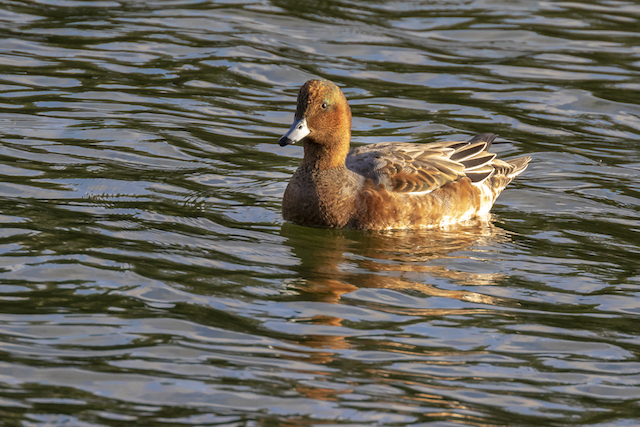 Wigeon
WigeonDogs (apart from guide dogs), cycling and jogging are not permitted, so disturbance to the wildlife is kept to a minimum making it ideal for birdwatching.
It is a seven mile walk around the reserve, but with 8 hides spread around the shoreline we haven't yet made it all the way round. On our first visit we parked at the Fishing Lodge and headed right, along an accessible gravel path to the first hide.
Ensure you wear suitable footwear!
I made the mistake of not changing into my walking boots and my feet were soon soaked!
The reserve is not circular. The best way I can describe the shape is to take your thumb and first two fingers and spread them as far apart as possible. Then imagine a line joining the base of your middle finger and thumb, this represents the causeway.
The beauty of this is that the far bank is never too far away offering good views of the wildfowl on the water.
Pitsford Water Nature Reserve is a Site of Special Scientific Interest (SSSI) as wildfowl numbers are significant in the winter and breeding birds visit in the spring.
Goosander Hide
 Goosander Hide
Goosander HideOur first visit to the Nature Reserve was in early October and some overwintering ducks had already arrived.
We also spotted Great Crested Grebe with their stripy headed youngsters (perhaps a second brood?).
Numerous Mute Swan, Greylag and Canada Geese along with Little Egret were present. We were surprised to see three male Pheasant on the shore across from the Goosander Hide.
A handy feature was a notice on the hide door showing how far away the next hide was in each direction. Just over one mile in the direction we had been travelling was the Lagoon Hide, so that was our next destination.
Lagoon Hide
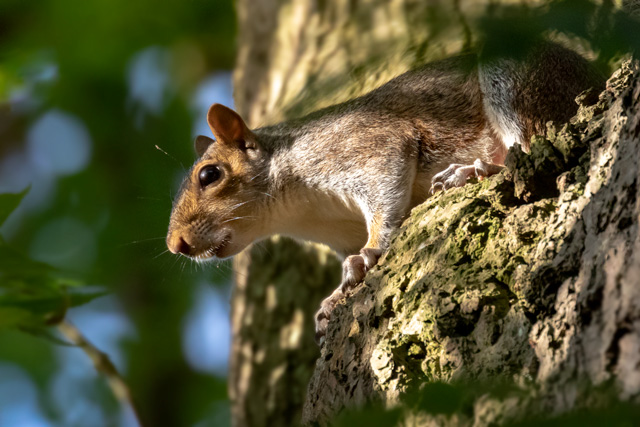 Squirrel chattering loudly in a tree
Squirrel chattering loudly in a treeI think we must have gone the long way around as it felt like more than a mile before we reached the next hide, or perhaps it was because I was carrying two cameras and a heavy tripod with a gimbal head!
However, it was a pleasant walk through woodland with occasional glimpses of the water through the tree line.
We rounded Holcot Pond and headed back along the other side of Holcot Bay.
The only disturbances were a noisy flock of Canada Geese flying overhead and an angry squirrel who swore at me from a tree.
Up until this point we hadn't met a single person at Pitsford Water since leaving the car park.
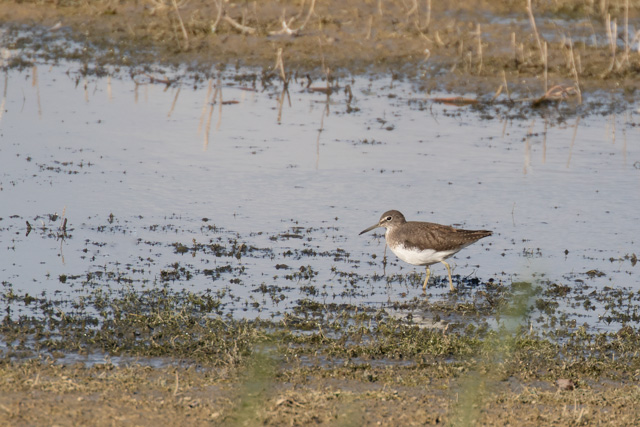 Green Sandpiper
Green SandpiperOn reaching the hide I set up the tripod and opened the hatch quietly so as not to disturb any birds.
The water level in the lagoons was low due to a long, hot summer but there were birds around. Most noteworthy was a Green Sandpiper bobbing along at the water's edge.
A Little Egret came close, allowing some good photos. I used spot metering and exposure compensation here, to avoid overexposing the white feathers. You can find more information on camera settings on my dedicated page.
There were more pheasants around, their plumage gleaming in the sunshine.
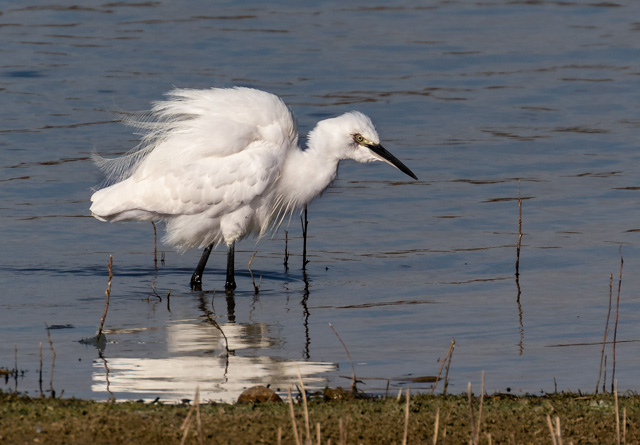 Little Egret
Little Egret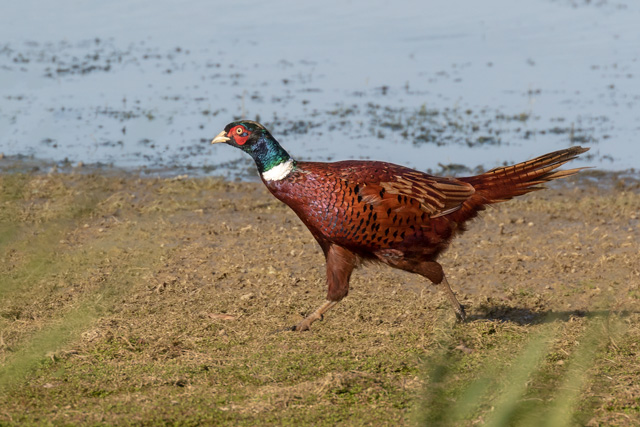 Male pheasant
Male pheasantMaytrees Hide
The next hide was some distance away so we decided to head back to the car and drive across the Pitsford Water causeway, park up and walk to the Maytrees Hide and bird feeding station from there.
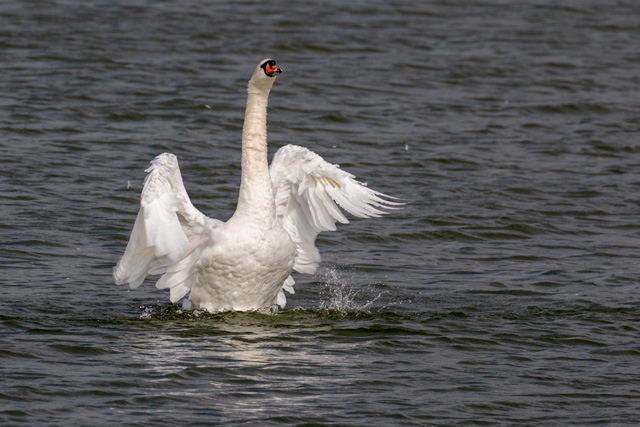 Mute Swan
Mute SwanThe access to this hide was open, with no screened boardwalk to prevent the birds from seeing us approach. Therefore, as we got closer many of the birds took off. The Mute Swans didn't seem too bothered and one posed for me.
Hubby was now getting restless and started hinting that he had had enough for one day, so we headed back to the car.
By this time my feet were sodden so we stopped at a supermarket on the way home to buy some dry socks!
Sadly we learned that in November, 2024, a fire engulfed Maytrees Hide, sparked by fireworks placed around its exterior and within the bird-seed bin.
Was this an act of sheer vandalism or a misguided attempt at celebration?
Fortunately, the fire didn’t spread to the adjacent bird-ringing area, which could have led to a more significant ecological disaster. This fortunate turn of events means that while the hide was lost, the surrounding habitat remains intact.
Return visit to Pitsford Water
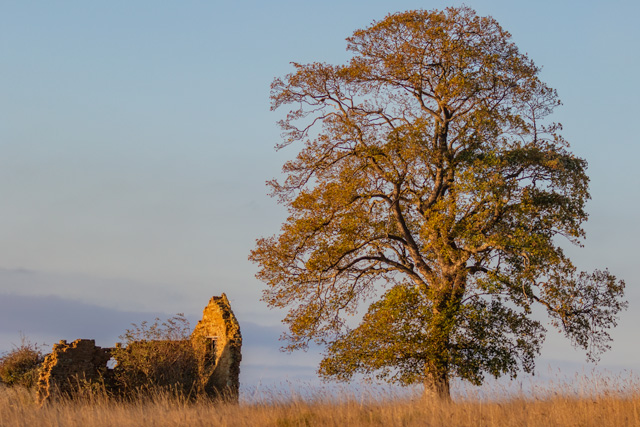 Ruins at sunrise
Ruins at sunriseTwo weeks after our first visit, we returned. This time we parked at the other end of the causeway, in the Pay and Display car park, then went anticlockwise around the reserve.
Yes, I did remember to change my shoes this time!
We had arrived just after sunrise and enjoyed what is known as the Golden Hour. This ruined building was visible from the road when I looked back towards the parked car.
We began our walk with a quick visit to the Maytrees hide. Plenty of wildfowl around but nothing close enough to photograph. Therefore we continued through Scaldwell Meadows offering great views of the water from the path.
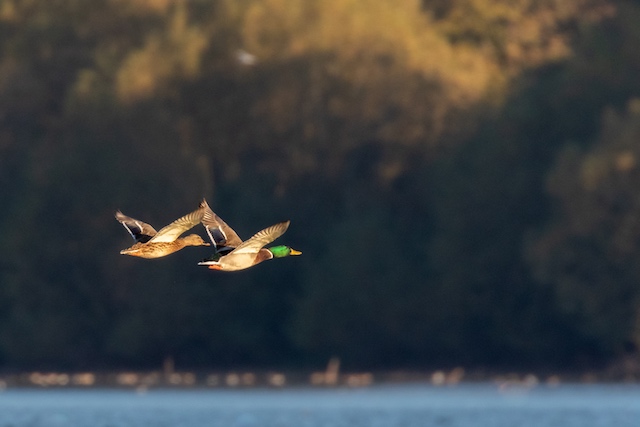 Male and Female Mallard illuminated by the sunrise
Male and Female Mallard illuminated by the sunriseBird Club Hide
The Bird Club Hide was soon in view as there is only about half a mile between the first few hides on this side of Pitsford Water. A screened boardwalk leads from the path, through the trees down to the hide, effectively obscuring our presence from the wildlife as we approached.
This turned out to be the best vantage point of the morning as we had the rising sun behind us.
I was happy to see a Great White Egret near the shore and trained my lens on it. The elegant white bird obliged by continuing its fishing and soon caught a sizeable breakfast!
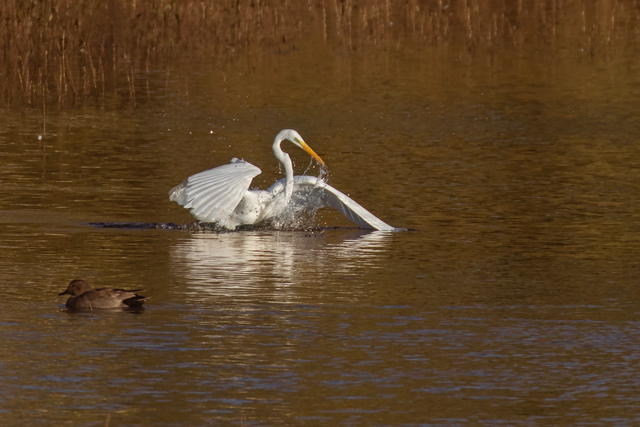
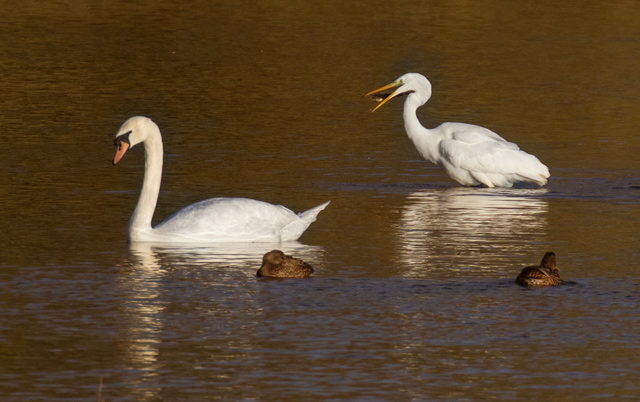
While watching the egret a flash of chestnut caught my eye in the distance.
A fox was walking behind the trees and across the shore. When it reached a fallen tree it climbed up onto it and observed the ducks in the water.
Those birds that spotted it took flight in panic, but it didn't seem too interested. In fact it made itself comfortable and lay down to rest in the sunshine allowing me ample time to photograph it.
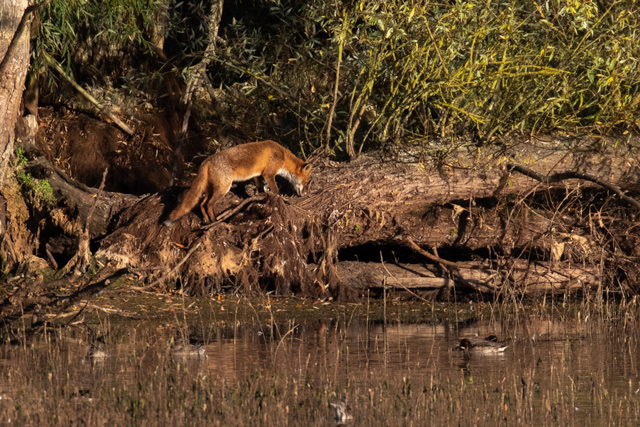
New James Fisher Hide and Scaldwell Hide
Hubby eventually dragged me away from the Egret and we walked on to the next two hides which are both reached by the same boardwalk.
They give slightly different angles over Scaldwell Bay. This was handy as all we could see from the first were silhouetted birds due to the angle of the light.
Scaldwell Hide offered a close up of a Lapwing, but I had to wait until it turned, so the light illuminated its plumage.
When we first moved to Cambridgeshire in the 1980s there were huge flocks of these birds in the fields around us, but sadly that is no longer the case.
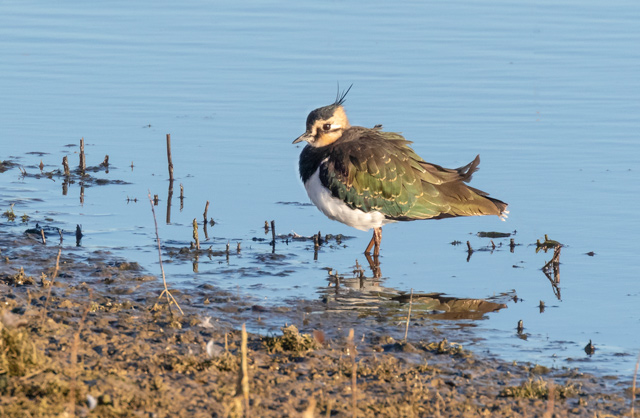 Lapwing (also known as Green Plover)
Lapwing (also known as Green Plover)We didn't linger long here. Opening the hide door we encountered a male pheasant walking down the boardwalk towards us. He changed his mind when he saw us and turned tail.
Sadly for us it was also time to change direction and head back to the car.
Maybe next time we will get as far as the Bird Ringing Hut and maybe Willows Hide which offers views of Scaldwell Bay from the opposite shore. This will then leave 3 hides around Walgrave Bay to check out on another visit.
On our return we popped back into the Bird Club Hide to see what else was about. I am so glad we did as Pitsford Water had more to give.
Swimming past was a pair of Red Crested Pochard, a species not often seen in our area. I waited for the light to shine on them and took what I thought would be my last photos of the day.
 Red Crested Pochard
Red Crested PochardAs we drew close to the Maytrees Hide once more I saw a Great White Egret fly past so couldn't resist capturing some images.
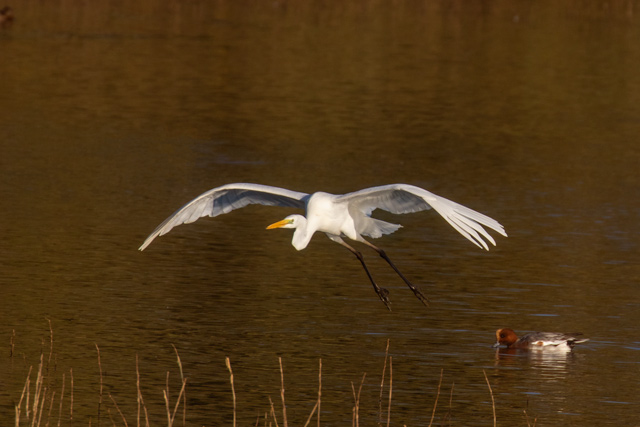
As we neared the car a Common Buzzard flew over so I rapidly changed my camera settings and snapped him against the bright blue sky.
A lovely ending to a fantastic morning. I am 100% certain we will be back at Pitsford Water before too long.
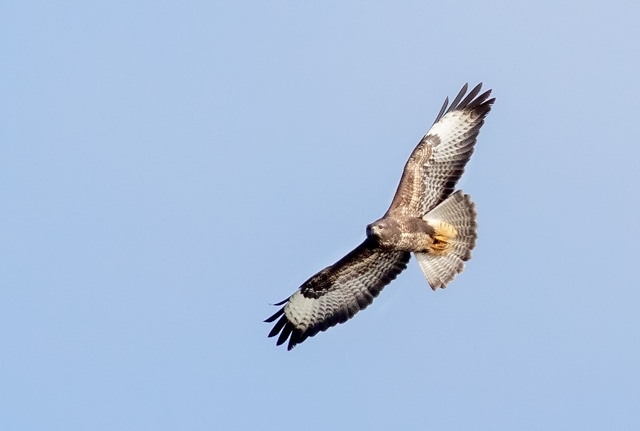 Common Buzzard
Common Buzzard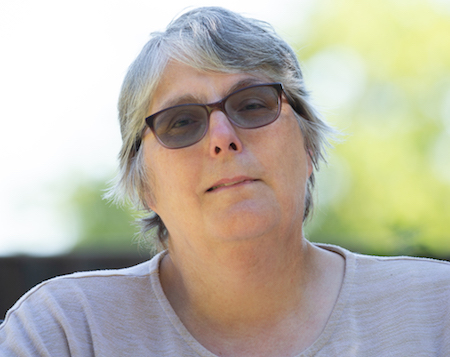
About the Author
Carol is a UK-based wildlife photographer and nature writer with a passion for peaceful walks, patient observation, and capturing life’s quiet wonders.
Through her lens and words, she shares the stories of the natural world — from bluebells and butterflies to birds like the great crested grebe.
Get closer to UK nature
Subscribe to Wild Lens!
Want to discover more hidden walks and wildlife moments?
I’d love to share my latest nature finds, photo tips, and peaceful walk recommendations with you.
💌 Join my newsletter Wild Lens—it’s free, occasional, and always rooted in a love of the natural world.
Subscribe below and come exploring with me.


